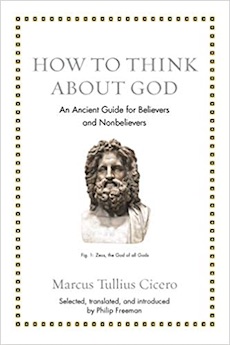By John McWilliams
The decades when required Latin in secondary school culminated in translating selections from a Cicero oration and from the Aeneid are now long past us. Cicero’s bit part in Shakespeare’s Julius Caesar has added little to his significance. Except for Classicists, Cicero is now dimly remembered, if at all, as a Roman politician and an authority on rhetoric, itself a sadly discredited subject. Two of Cicero’s most famous phrases, Otium Cum Dignitate (leisure with dignity) and Concordia Ordinum (harmony of the classes) are now too readily seen as pompous, privileged, and outdated, rather like the marble bust of a Roman dignitary.
Philip Freeman’s volume avoids the potential problem of reader condescension by giving us an unfamiliar Cicero, a thoughtful philosopher of religion who did not bow down to the authority of the Greeks, neither Plato nor the Stoics. Freeman gives us sections of two long works, De Natura Deorum and De Re Republica, but asks his reader to consider Cicero’s beliefs within the universal context of the book’s title, How to Think About God. Part of a Princeton University Press Series titled “Ancient Wisdom for Modern Readers,” each volume of the series is headed by a title that begins “How to . . . .” Readers of Freeman’s book, whether believers or nonbelievers, are thereby directed to seek for ancient wisdom applicable to today. As a consequence, Cicero’s speeches in the Forum, as well as his vexed, ever-shifting relationships with Cato, Pompey, Brutus, Caesar, and Octavian, tacitly and entirely disappear.
Freeman presumes that, throughout De Natura Deorum, Cicero speaks repeatedly through the voice of Balbus the Stoic. Accepting Freeman’s premise, the reader immediately discovers that Cicero had little or no interest in the Greek and Roman pantheon of Gods. Jupiter is mentioned only once; Mars, Venus, Apollo, and the rest of them, including even Minerva, are ignored. Instead, Balbus begins by unfolding what would be called, 1500 years later, the “Argument from Design.” Conceding that “the first point—that the gods exist—scarcely needs discussing,” Balbus immediately undercuts polytheism by stating that “there is some divine power of surpassing intelligence which rules over this realm. . . and not only as the god Jupiter, but as lord of the universe, a present and mighty god, who rules everything by his command.” This “superior intelligence” is then defined as “reason and wisdom,” which, emanating from God, must pervade the universe, even though we may not discern it. Gone are the caprice, squabbling, and vengeance of Homeric and Virgilian gods.
Zeno’s syllogism is allowed to stand uncontested: “That which uses reason is superior to that which does not. Nothing is superior to the universe. Therefore, the universe uses reason.” But Cicero will not stop there. He argues for pantheism (“thus it follows that the universe is God”), then concludes De Natura Deorum with an assumption dear to many a 19th century advocate of Progress: “In every component of the universe there is a striving for ultimate perfection.”
De Natura Deorum proceeds by logic and abstraction. “The Dream of Scipio,” which concludes De Re Republica, is both a spiritual journey and a dream vision that calls upon the reader’s capacity for wonder. The essence of the afterlife is handed down from ancestor to descendant, from a paternal figure to an eagerly learning son. Widely read in the Middle Ages, “The Dream of Scipio” would have a long legacy, from Virgil’s sixth Aeneid through Dante and Milton to later adaptive forms of epic. Scipio’s heroic grandfather discloses to him that the heavens are the Milky Way, the universe itself, not a separate place above and apart from us. In this placeless place, “a shining circle bright with light,” “eternal happiness” will be granted after death to those who preserve the Republic, protect the family, uphold just laws, and serve the state.
In the meanwhile, however, “this thing you call life is in fact death.” We are in death. Lasting life will be found only after escape from the body to reabsorption into the divine whole, which is everywhere. The promise and harmony of the universe are available to us here, now, and always in the music made by the spheres. If we would hear the music, we might be able to collectively follow Virtus (“manliness” as well as our “virtue”) to true and lasting honor, which is by no means reserved for the military. The only undeniably valid perspective on present day Rome, be it republic or empire, is that Rome is but a latitudinal sliver of the earth, a dot in space. The young Scipio, is finally led to acknowledge “I was ashamed of our empire that was little more than a point on earth.”
Freeman’s book gives us a Cicero who is neither the great orator, the Roman politician, or a second-tier philosopher from the Graeco-Roman Ages. His Cicero is a wisdom prophet; a Deist in pursuit of reason, science, and progress; a Unitarian in the making; even if you will a Transcendental pantheist. Who would have thought it of ponderous, dusty Cicero? And yet, upon further reflection, it should seem no surprise that both John Adams and Thomas Jefferson revered Cicero. By studying Cicero’s anxious responses to the failing Roman Republic, they hoped to devise a better American Republic that would include religious toleration bolstered by separation of powers and a stable Senate. Perhaps even Emersonian Transcendentalism, once claimed to be a home-grown product, may owe more to Cicero than we have ever imagined.
John McWilliams (ΦBK, Princeton University, 1962) is an emeritus professor of humanities at Middlebury College and a resident member of the Beta of Vermont Chapter of Phi Beta Kappa.




